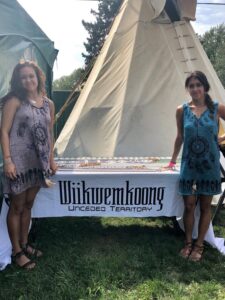‘A pow wow to remember’ series: Amber Manitowabi-Huebner
In a continued effort to lift everyone’s spirit during this time where we are all staying home, the Anishinabek News did a call out to the Anishinabek Nation to submit their fondest pow wow memory. The spring series is called: A pow wow to remember.
Some go to pow wows to see the beautiful regalia. Others go to feel the strength of the beating drum. Some go to connect with family and friends. One way or another, pow wows draw us all in for one reason or many, but above all else, it’s to come together and celebrate us and those who came before us. Our traditions. Our culture. Our language. Our authenticity and identity. While the 2021 pow wow season may be impacted by the global pandemic, let’s use our memories from pow wows past to help us maintain our strength and perseverance.
The Anishinabek News hopes this series brings you light and hope during these challenging times of uncertainty, and inspiration to keep moving forward on your journey – whatever it may be; or maybe even dance.
The 2021 Great Lakes Pow Wow Guide can be found here.

By Amber Manitowabi-Huebner, Wiikwemkoong Unceded Territory
When I was one year old, I was put into foster care, because my parents were unable to take care of me. My father, who is one-hundred percent First Nation and a member of Wiikwemkoong Unceded Territory, did not want anything to do with me. Being adopted away from my Indigenous side of the family has caused me to feel unsure of where I fit in and consequently, suffer from identity issues. The older I get, the more I realize this is a side of myself that I want to learn more about.
I am a Community Health Education major at Northern Michigan University. Following graduation, I have goals of pursuing a Master’s in Public Health at Grand Valley State University. One day, I hope to become a Public Health Specialist working with tribes across the Midwest. Thankfully for me, the classwork in my Community Health Education Degree provides me with the perfect knowledge and background to work with individuals across the country.
I grew up in a non-Indigenous household in Marquette, Michigan. My biological grandparents did an amazing job of being actively involved in Title 7 and the Indigenous community in Marquette. Marquette is a small city, yet still the biggest city in the Upper Peninsula. Like many Indigenous youth growing up in this situation, it was hard for me to become engaged in the culture, traditions, and community. I remember growing up wishing I was not Indigenous because I wanted to fit in with my friends and I did not want to be “different.” My tan skin and dark features made it impossible for me to avoid the, “What are you?” types of questions. As a mixed-race person, I’m trying to imagine how being asked, “What are you?” would feel like if I was Caucasian. The more I learn about myself and my heritage, the more proud I become of who I am and the community I come from. Indigenous people are resilient. Indigenous people are strong. Indigenous people are survivors.
I went to multiple pow wows growing up, but never really understood the importance of them. Once again, I did not know where I fit in. That is until I went to a pow wow in my homelands of Wiikwemkoong where I felt like I knew my place in the Indigenous community. In the summer of 2018, my sister, grandma, and I took a road trip to Wiikwemkoong Unceded Territory, a First Nation on Manitoulin Island situated in Northern Ontario. We attended the 58th Annual Wiikwemkoong Cultural Festival. I have no words to describe that experience other than amazing. It was amazing to visit my clan and see a First Nation with strong leaders and a good community base, who proudly wear the same name Manitowabi. Something I have not always been able to do.
Attending the pow wow was simply amazing; being able to see that many dancers dressed in regalia was heartwarming and brought tears to my eyes. Indigenous people have fought through so much adversity, abuse, and trauma, and now years later, are once again able to come together, dance, and celebrate life.
Spending all day at the pow wow and learning more about the clan I am a part of was a life-changing experience that I will never forget. I got the chance to stand alongside my Manitowabi family at the Pow wow, and meet cousins, aunts, and uncles, who I never previously had the chance to meet.
I am proud of who I am and where I come from. Needless to say, this was a pow wow to remember.


